Despite the turbulence surrounding Ursula von der Leyen's bid for a second term, she and the new European Commission won a clear majority in Strasbourg on Wednesday: 370 in favour, 282 against, with 36 abstentions.
However, the margin was lower than confirmations going back several decades. Rarely has the political mood in the chamber felt so fractious.
This was a vote for the new College as a whole.
Ms von der Leyen had won a clear endorsement in July to be given a second term as Commission President.
The path was therefore clear for the four Fianna Fáil MEPs - who'd defied Micheál Martin to reject her in July - to vote in favour of the new College.
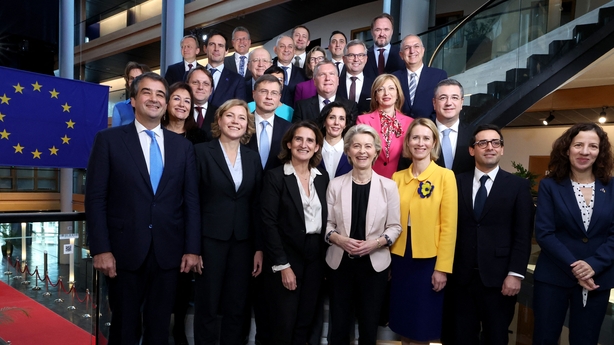
As expected, Sinn Féin’s Lynn Boylan and Kathleen Funchion, as well as Independent MEP Luke 'Ming’ Flanagan, voted against the new commission.
A more surprising dissenter was Labour MEP Aodhán Ó Ríordáin, despite the Socialists and Democrats (S&D) largely backing Ms von der Leyen's team in order to shore up the pro-European centre.
Mr Ó Ríordáin said he had been encouraged by Ms von der Leyen's creation of a housing commissioner, believing that a no-fault eviction ban across the EU might be possible over the next five years.
But at the last minute he decided to vote against it over her handling of the Gaza war.
"Ursula von der Leyen compounded her Gaza issue without mentioning it [in her speech]," said Mr Ó Ríordáin.
He added: "[Also] the dissatisfaction within the S&D group over her doing deals with the far-right rather than the centre - it was just something I couldn’t stomach."
'Playing petty politics'
Fianna Fáil's Cynthia Ní Mhurchú wasted no time in chastising the six (out of 14) Irish MEPs who either voted to torpedo the new commission or abstained (namely, Independent Ireland’s Ciarán Mullooly and independent MEP Michael McNamara).
"All commissioners nominated by Member States had undergone intensive confirmation hearings in the European Parliament including Michael McGrath. They were approved by the European Parliament."
She added: "To abstain now on the vote is playing petty politics at a time when Ireland needs a functioning European Commission to get down to work on issues of key importance for Irish agriculture, climate, competitiveness, and migration."
Confirming a new commission has become intensely political.
Parliamentary hearings to grill nominees for their suitability for the job - and to flush out closet skeletons - are not enshrined in the Lisbon Treaty.
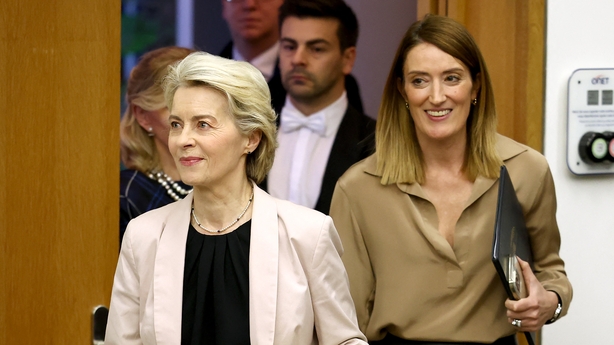
The founding Treaty of Rome makes no reference to the European Parliament (or Assembly, as it was then) in having a say.
It was only with the Maastricht and then Amsterdam treaties that MEPs were given first a consultative role then a formal confidence vote on the Commission President.
The Lisbon Treaty went further, linking the results of the European elections to the right of EU leaders to appoint a new Commission President (leaders would now have to "consider" the result of the elections when assessing a presidential candidate).
Furthermore, the candidate now needed an absolute, instead of simple, majority; the parliament changed its own rules too (in 1994), meaning it gets more of a say.
"The European Parliament has taken every opportunity since then to flex its muscles with every new incoming Commission and effectively forced change, at least to the distribution of portfolios, and the College’s composition," says Sophia Russack, a researcher at the Centre for European Policy Studies (CEPS).
"While party politics have always played a dominant role, the control of the (big) political parties and the targeting of political opponents seems to have increased."
That has been true to varying degrees with this approval process.
Tit-for-tat
Technically, MEPs can't vote to block individual nominees - they can only vote down the entire commission.
However, if there is overwhelming discontent with a candidate then he or she usually withdraws.
Or there can be tit-for-tat: if a centre-right candidate is dumped, then the centre-right will insist on a centre-left scalp.
Ironically, on this occasion no nominee had to fall on their sword, despite a toxic political mood in the wake of the June European elections.
Those elections saw a significant power shift to the right.
There are now 111 MEPs from the combined far-right, and 78 for the hard right European Conservatives and Reformists (ECR), meaning a right-wing, Eurosceptic bloc of 189 MEPs.
That is up against a pro-European bloc of 454 MEPs (188 from the centre-right European People’s Party [EPP], 136 from the S&D, 77 Renew Group MEPs and 53 Greens).
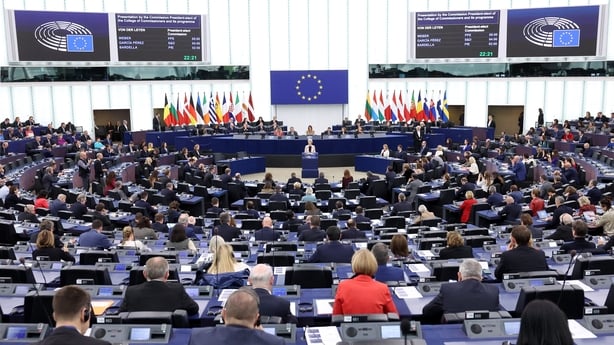
While a clear majority for the pro-European centre remains, there's been significant fragmentation thanks to Ms von der Leyen's EPP leaning on the ECR for support on key issues.
Critics have said this has dragged her, and her party, further to the right, especially on climate issues.
The EPP had already helped water down the Nature Restoration Law in the spring, and in September Ms von der Leyen, to the fury of environmental groups, delayed for one year the deforestation regulation, which would limit third country imports of coffee, cocoa, palm oil etc that might have been produced thanks to deforestation.
There have been suggestions, too, that Mercosur countries leaned on the European Commission to delay the deforestation law as the price for getting the EU-Mercosur trade deal over the line before Christmas.
In late October, an unnamed commission official told the environmental news website Ends Europe: "The deforestation regulation specifically has been now delayed by a year for all parties to be able to prepare better so… it doesn’t look like it’s going to influence the likelihood of getting the [Mercosur] deal done."
The commission has insisted it was delayed because "several global partners have repeatedly expressed concerns about their state of preparedness," and that "preparations amongst stakeholders in Europe are also uneven."
'Rotten trade deal'
Sinn Féin's Lynn Boylan is unconvinced, believing the delay was "partly" done to pave the way for the ratification of Mercosur.
"We know that Mercosur is a rotten trade deal that will do huge damage to people and planet," she said.
"I have consistently called on the Irish Government to formally notify the European Commission of Ireland’s opposition to this deal and to form a blocking minority at the EU Council."
Following the elections in June, the Centre for European Reform (CER) predicted that "the rise of far-right and populist right-wing parties will motivate the [EPP] to reach further to the right, in the hope of winning disillusioned voters back. This trend is likely to be especially pronounced in the area of climate and environment."
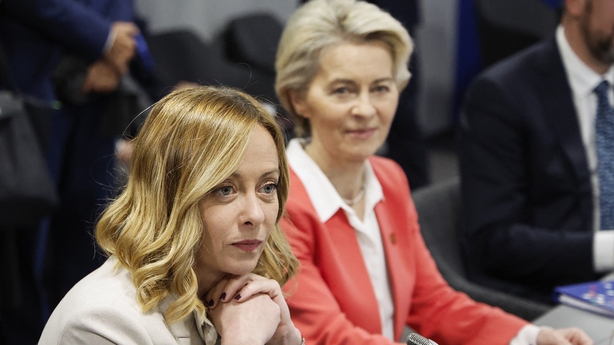
Not only there. Ms von der Leyen has relied on Italy’s ECR prime minister Giorgia Meloni to support her getting a second mandate, and in return Ms von der Leyen promised to elevate Ms Meloni's candidate Raffaele Fitto to be one of six executive vice presidents of the new commission.
This was too much for many in the centre-left, Renew and Greens, who are appalled at the idea of a party with neo-fascist roots elevating a candidate to the highest echelons of EU policy making.
In reality, Mr Fitto had come from the late Silvio Berlusconi’s centre-right stable and had been seen as a pragmatic and cooperative Europe minister in Ms Meloni's government.
That didn't stop the leader of the Green's, Bas Eickout, delivering a passionate denunciation of those who argued that Mr Fitto was not really far-right.
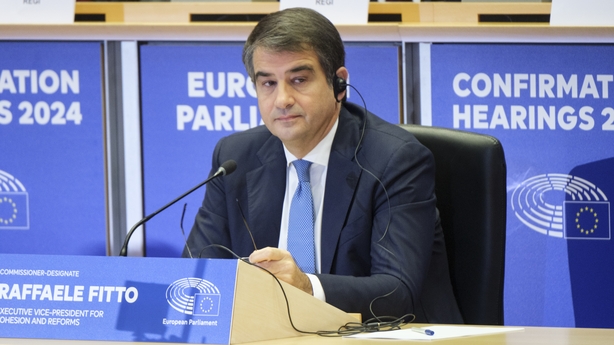
"Tell that to the mothers in Italy whose rights to have children together have been taken away just because they want to live together," he declared.
"Tell that to the judges who are criticised by the government for just doing their job. Tell that to the journalists who feel under pressure more and more just to do their jobs independently."
In September, the S&D threatened to block Mr Fitto’s nomination; the EPP retaliated, threatening to block Spain’s Teresa Ribera - the S&D candidate earmarked for the centre-left’s highest-ranking portfolio - unless she returned to Madrid to be grilled over her handling of the devastating Valencia floods.
'Blank cheque'
All the while, the traditionally Eurosceptic ECR played nice by supporting 19 out of 20 Commissioners-designate in the committee hearings, including Ireland’s Michael McGrath.
With the S&D bluff called, it was left to the party president Iratxe García Pérez to issue a wounded, plaintiff message to Ms von der Leyen moments before the vote on Wednesday.
"We’re not giving you a blank cheque," she said of her party’s qualified support for Ms von der Leyen.
Ms García Pérez added: "European forces have built the EU since it began, and we have an agreement. You have to honour agreements: be faithful to your pro-European tradition and re-commit to the pro-European majority.
"We will not accept you playing both sides. You cannot build Europe with those who want to destroy it."
Ms von der Leyen has argued that the march of the far-right means the EU must be fully on listening mode to bring citizens with them on climate goals.

Her new work programme resonates with promises of dialogue with industry and citizens on climate goals, but to many this is naked pandering to the far-right.
Following the delay of the EU’s deforestation regulation, the World Wildlife Fund (WWF) described the move as "shameful".
Ms von der Leyen’s EPP, said Anke Schulmeister-Oldenhove, WWF’s Forests Policy Manager, had "aligned with extreme right-wing factions, putting political posturing over climate action, opening the gates for deregulation whilst casting aside pleas of European citizens and responsible companies to protect our forests."
There is also little evidence that the far-right, emboldened by Donald Trump’s return to the White House, will be placated by promises to ease the pace and intensity of Europe’s decarbonising agenda.
Yet, the EPP remains the driving force in European politics.
There are 14 EPP commissioners out of 27, including Ms von der Leyen, and 13 member state governments are currently led by the EPP (if you include Simon Harris and Michel Barnier, the French Prime Minister).
Numerous officials and diplomats have suggested Ms von der Leyen has been assiduously vetting applicants getting jobs in the cabinets of the new commissioners, with German and EPP-linked officials in place throughout.
The fact that so many of the new portfolios have overlapping briefs has led to suspicions that the new commission’s structure deliberately provides Ms von der Leyen with an added arbitrative power.
Historic struggles
Invoking the historic struggles of Europeans to achieve freedom and democracy, she promised a hard road ahead, with the second Trump administration looming, a more assertive China, wars threatening Europe’s borders in Ukraine and the Middle East, and the EU’s loss of competitiveness relative to the US, China and India.
"These freedoms will not come for free," she told MEPs on Wednesday. "It will mean making difficult choices. It will mean massive investment in our security and prosperity. And above all it will mean staying united and true to our values.
"Finding ways to work with each other - and overcoming fragmentation. This is what I - and all 26 women and men with me - will strive for every single day."

Fragmentation is certainly an issue.
Spanish members of the EPP voted against Ms von der Leyen because of their opposition to Teresa Ribera, while French and Belgian S&D MEPs also rejected her (neither the Greens nor the centrist Renew were unanimous in their support).
As a result, only 54% of the chamber supported the new commission, compared to 47% who rejected it. Ms von der Leyen enters her second term with the smallest parliamentary majority since 1993.
That's a reflection of the growing wedge of MEPs on the far-right (and far-left) who are prepared to block or frustrate European integration at the very moment when many governments (and citizens) believe it is more necessary than ever.
Ms von der Leyen is gambling on steering the ship by keeping the ECR close.
It may work, but the storms being whipped up by Donald Trump, Vladimir Putin, the wars in the Middle East, and a surge in migration, will continue to pummel the vessel.







